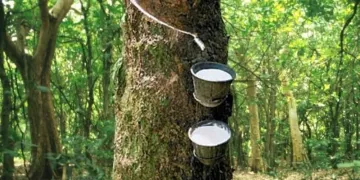In what appears to be a landmark move, the Rubber Board is planning to standardise the quality of planting materials across the country. If everything goes as planned, the project will take off in June this year, coinciding with the onset of planting season.
Initially, five lakh certified rubber saplings will be distributed in Kerala. States like Tripura and Assam will be covered soon under the project. The Rubber Board recently constituted a committee under the chairmanship of rubber production commissioner J Thomas to formulate the modalities for standardisation and certification of planting materials/nurseries.
“During the initial phase of the standardisation project, the private nurseries voluntarily come forward to test and certify the saplings. The Board expects that with the project the productivity of the plants is likely to increase. The areas which have a huge potential for rubber cultivation are Arunachal Pradesh, Assam, Manipur, Meghalaya, Mizoram, Nagaland and Tripura. We wish to expand the standardisation to these regions soon,” said M G Sathees Chandran Nair, deputy director of the Rubber Board.
A draft report was published on the website of the board to invite comments from various stakeholders and is being finalised now.
“The quality of planting materials is more pertinent in rubber considering its long gestation period and economic life. There has been a wide-ranging national concern about spurious supply of planting materials by private nurseries. Subsequent to temporary suspension of approval of private nurseries in 1986, the nursery business became a lucrative trade and put aside the quality and ethic,” the report said.
The committee also recommended Good Nursery Practices and formulated standardisation procedures including suitable land for nursery, methods for plant protection, proper irrigation facility, usage of pesticide and poly house with sufficient space.
At present during a planting season around one crore rubber saplings are distributed across the country, the Rubber Board provides only 12 lakh saplings. The rest is bought from private nurseries. This calls for a uniform quality standard, experts point out.
– newindianexpress.com


























